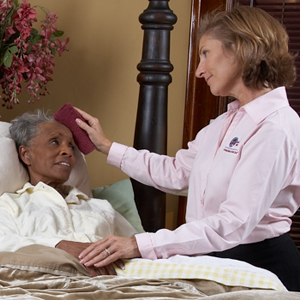More Coronavirus Resources:
Wednesday, February 26, 2014
Living independently is important to all of us, but it's especially important to seniors. As they age, seniors face unique challenges, such as losing a spouse and elderly friends, changes in physical and mental abilities, and other general lifestyle changes that often occur during the golden years. Living in a comfortable and familiar environment becomes paramount to a senior's happiness and feeling of well-being. As the relative, friend or caregiver of a senior, it is important for you to help seniors achieve this goal.

One area that deserves special attention with seniors is managing medications they take. The number of medications they are required to take usually increases with age, as seniors are often prone to health conditions that are regulated by medicine. Taking the medications is important. However, it is equally important for seniors and their family caregivers to understand what medications the senior takes, the possible side effects of each medicine and the potential adverse effects of taking different types of medications at the same time. Mismanagement of medications can be detrimental and sometimes even life threatening.
Medication mismanagement can be minimal or extreme. Forgetting to take medication can cause obvious problems but may not be of great concern if it does not happen often. However, combining some types of medicines can cause critical adverse reactions, and if a senior is required to take painkillers, addiction can rear its ugly head. For these reasons it becomes essential to keep seniors well informed of the hazards mismanagement of medications can cause. It's also critical to keep the senior's doctor informed of all of medications the senior is taking and any apparent adverse side effects.
Signs of medication misuse include dizziness, nausea, confusion, memory issues, increased falls, troubled sleeping patterns, incontinence and even hallucinations. Malnutrition can also indicate improper medicine administration, because confused seniors may not eat properly. Seniors who become addicted to painkillers may become secretive regarding their use of those drugs and seek prescriptions from various doctors and pharmacies. In extreme but not uncommon cases, some medications -- when mixed -- can cause death.
Seniors who have trouble successfully managing medications are not alone. In fact, research indicates that approximately 40 percent of people entering nursing homes do so because they are unable to self-medicate in their homes. In addition, 30 percent of all hospital admissions for people over age 65 are directly attributable to missed doses or overdoses of medication.
With these statistics in mind, the medical community has offered advice and other solutions to help seniors manage medications in their own homes. When family members visit, it is an opportunity to remind seniors to take their meds at designated times. If possible, seniors are encouraged to keep logs of the times they take their medications in order to keep track, determine the time of their next dose and to prevent over-dosage.
Research shows seniors who live alone are more likely to inadvertently misuse medications. Knowledge is power, but control is key regarding medication management. The reward in helping seniors properly manage their medication is helping them achieve their ultimate goal of living healthy, independent lives in their own homes for as long as possible.
References
Agingcare.com (2012). Seniors and prescription drug addiction. Retrieved on February 10, 2012, from agingcare.com/Articles/help-for-elderly-prescription-addiction-133459.htm
Agingcare.com (2012). Surprising list of medications cause majority of senior overdoses. Retrieved on February 10, 2012, from agingcare.com/Articles/senior-drug-overdose-148701.htm http://www.agingcare.com/Articles/senior-drug-overdose-148701.htm
Caregivingstress.com (2012). The warning signs. Retrieved on February 10, 2012, from caregiverstress.com/senior-safety/health-information-management/senior-medication-management/warning-signs/
Marek, Karen Dorman. Ph.D., M.B.A., R.N., F.A.A.N. Antle, Lisa. A.P.R.N., B.C., A.P.N.P?
U.S. National Library of Medicine - National Institutes of Health (2012). Chapter 18 medication management of the community-dwelling older adult. Retrieved on February 11, 2012, from ncbi.nlm.nih.gov/books/NBK2670/







